“It’s all about children thriving”
UNICEF-supported pilot programmes are helping children thrive in China and beyond
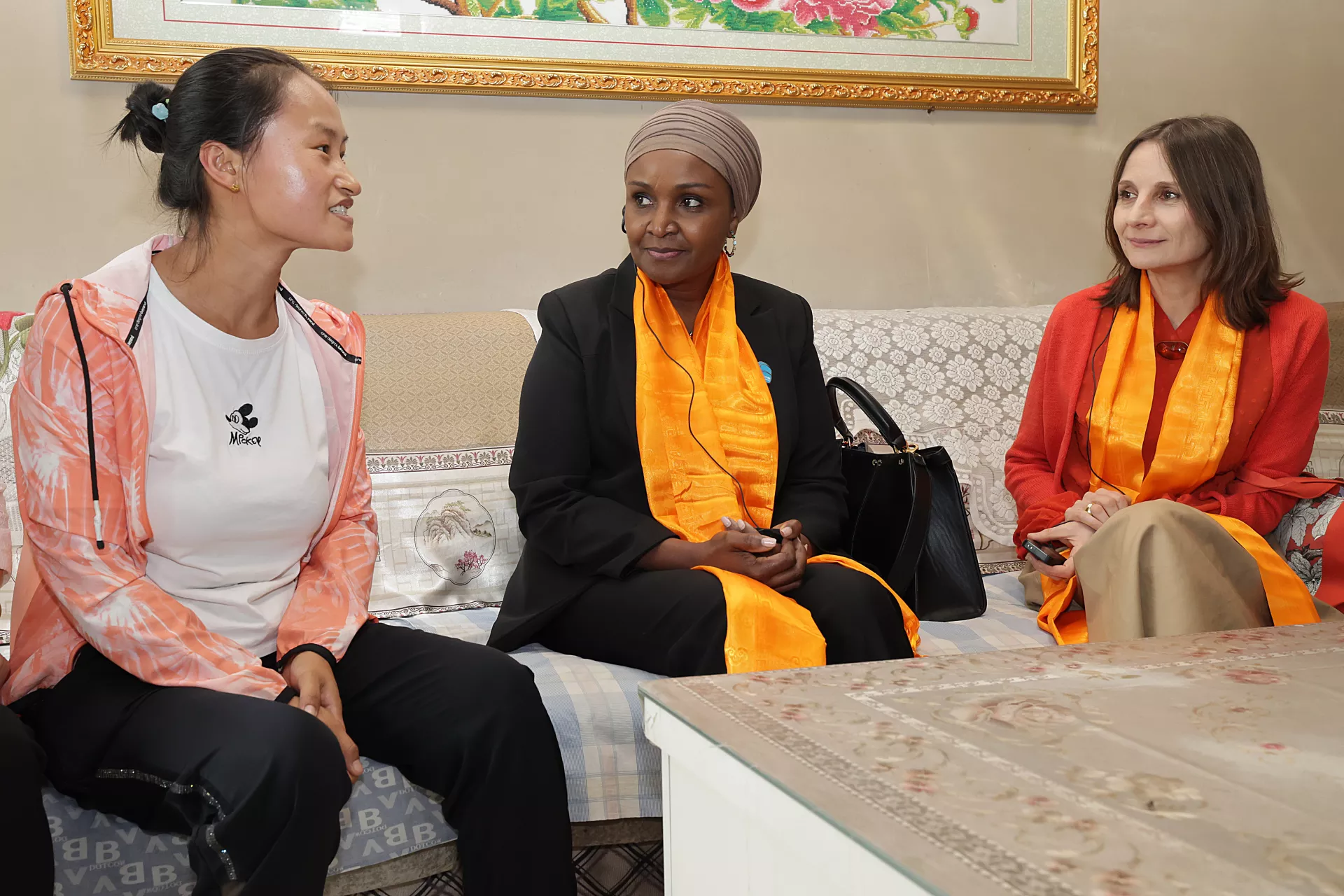
- Available in:
- 中文
- English
Dai Lanli, 34, lives in an underdeveloped and ethnically diverse region in Qinghai Province with her three daughters aged 12 years, 6 years and 18 months respectively. When the youngest child was delivered, Dai’s experience was quite different from the births of her other children.
Immediately after the birth of Dai’s youngest child, the baby was dried thoroughly and laid directly on the mother’s chest for uninterrupted skin-to-skin contact. In contrast, after Dai’s previous deliveries, the babies had been separated from her for showering and weighing. “Having my baby in my arms [after birth] made me build a much closer attachment,” she told UNICEF Regional Director for East Asia and the Pacific Debora Comini, who visited her family in Qiaka Village, Qinghai Province.
Mother-baby skin-to-skin contact is a crucial component of Early Essential Newborn Care (EENC), a package of simple, cost-effective interventions introduced to China by UNICEF to ensure more mothers and newborns will survive and thrive.
To meet the commitment of leaving no one behind, UNICEF has also been working with the Government of China through programmes in Qinghai to improve nutrition and early childhood development, and to provide safe, inclusive and climate-resilient sanitation facilities.
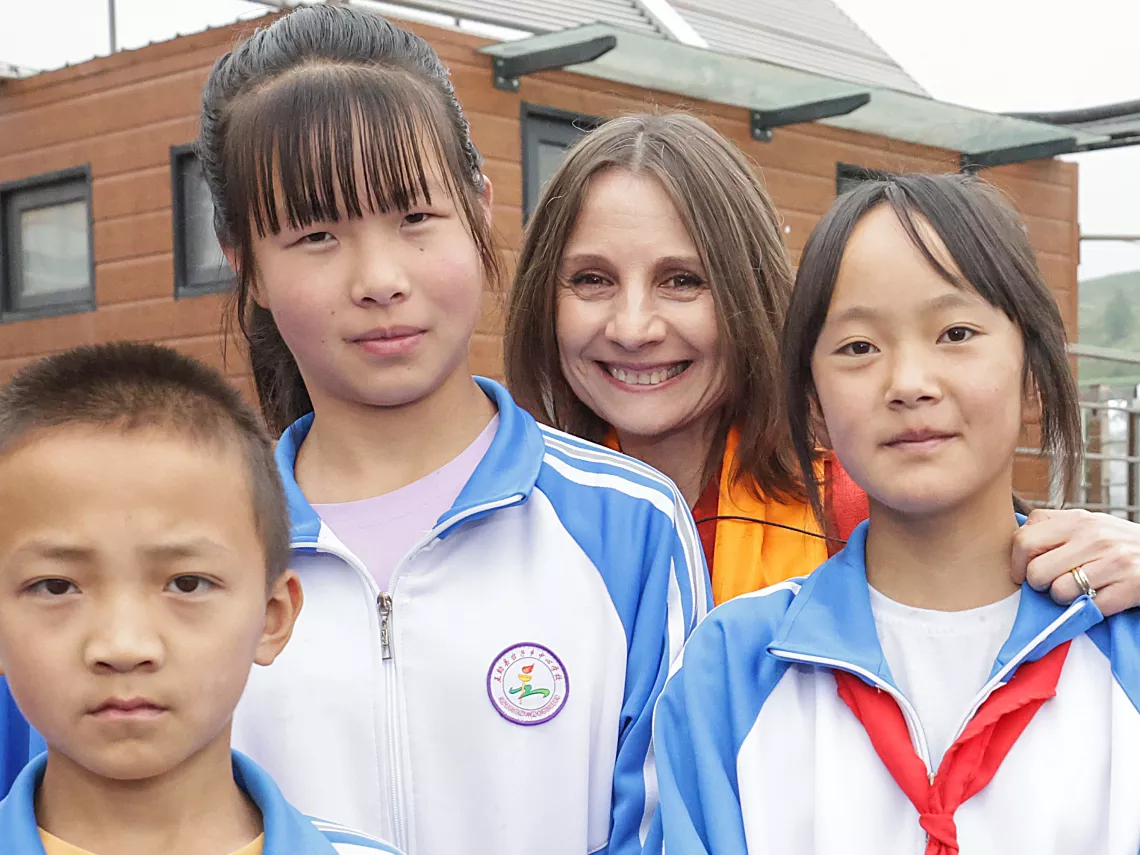
Ms. Comini visited Huzhu Tu Autonomous County in Qinghai to meet some of the children and families who are engaged in UNICEF’s programmes, as well as those who help deliver these services. “I am happy to see that UNICEF-supported programmes are helping children survive and thrive in Qinghai. The success in Qinghai has laid a solid foundation for scaling up the programmes nationwide, which will benefit millions of girls and boys,” she said, adding, “UNICEF is committed to supporting the Government of China to realize the rights of every child.”
Simple, cost-effective interventions improve newborn survival
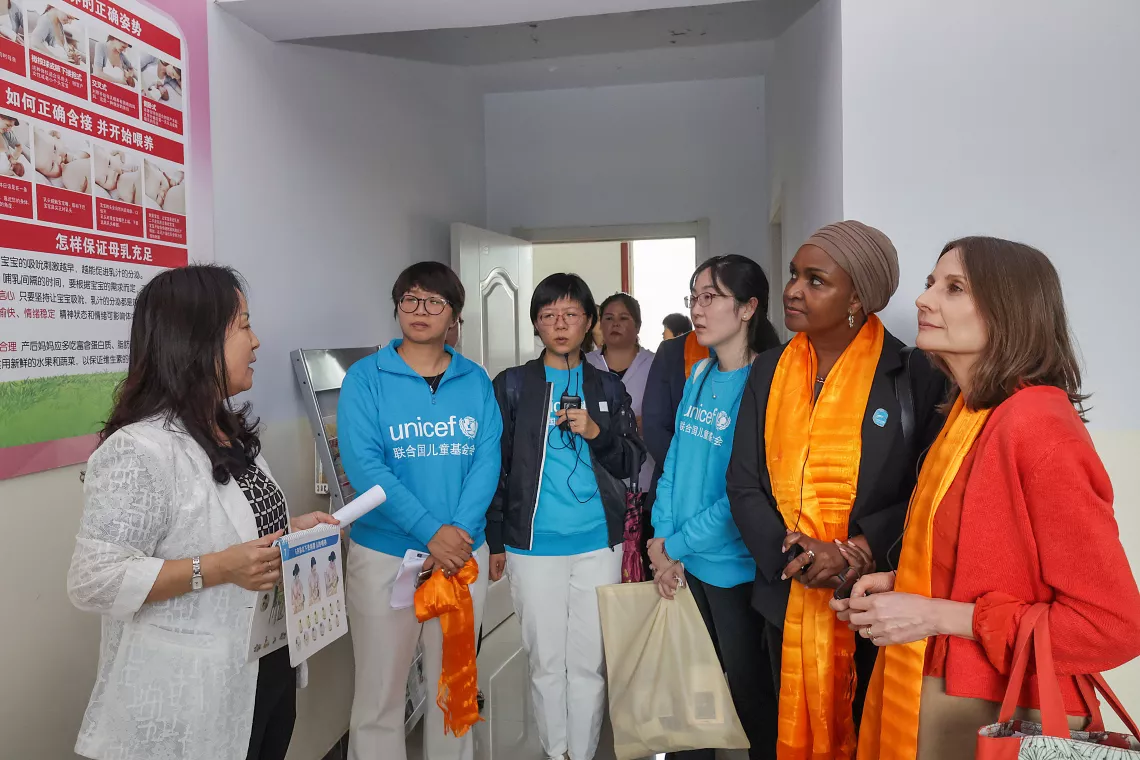
EENC is a proven life-saving practice that benefits mothers and newborns. In addition to mother-baby skin-to-skin contact, other key components include delayed umbilical cord clamping, early breastfeeding initiation, and kangaroo mother care for premature infants (a practice that uses skin-to-skin contact to warm and nurture a newborn baby, particularly those who are premature or born with low birthweight).
Dr. Li Yonghua, Director of the Information Department of Huzhu County Maternal and Child Health Hospital, told Ms. Comini the county started piloting EENC in November 2017. “Every year, 72 per cent of newborns in our county receive EENC interventions. To date, 8,250 newborns have benefited from the programme,” she said, adding that EENC helps reduce the incidence of newborn diseases, and maximizes the chances of early initiation of breastfeeding.
Dai started breastfeeding her youngest daughter half an hour after she was born. She continues to breastfeed her now and is committed to keeping it up until the girl is two years old.
In November 2022, UNICEF and the National Health Commission co-launched the EENC scaling-up programme, which covers all 31 provinces in the Chinese mainland. It aims to improve capacity building and provision of EENC services at delivery across all levels of the health system. More children and their families nationwide will receive core EENC interventions, just as Dai and her baby girl did.
With enhanced capacity, primary health workers serve as a lynchpin to improve child nutrition
Dr. Zhao Mengping from the Taizi Township Health Centre and Dr. Ajicun from the Qiaka Village Clinic are part of a network of health workers who provide day-to-day nutrition and feeding counselling to caregivers. They use every opportunity, from prenatal check-ups, children’s routine physical checks and immunization visits, to the distribution of Ying Yang Bao (a food supplement provided to children aged 6 months to 2 years for free) to provide science-based advice on how they can improve their children’s nutrition.
From time to time, Ajicun checks in on Dai and her baby girl. Dai takes care of her three daughters by herself, because her husband and parents-in-law are working better-paying jobs in another region. Although she takes care of all the housework, Dai is always careful when it comes to feeding her baby. She provides a diverse diet with fresh meat and vegetables to keep the baby growing healthily.
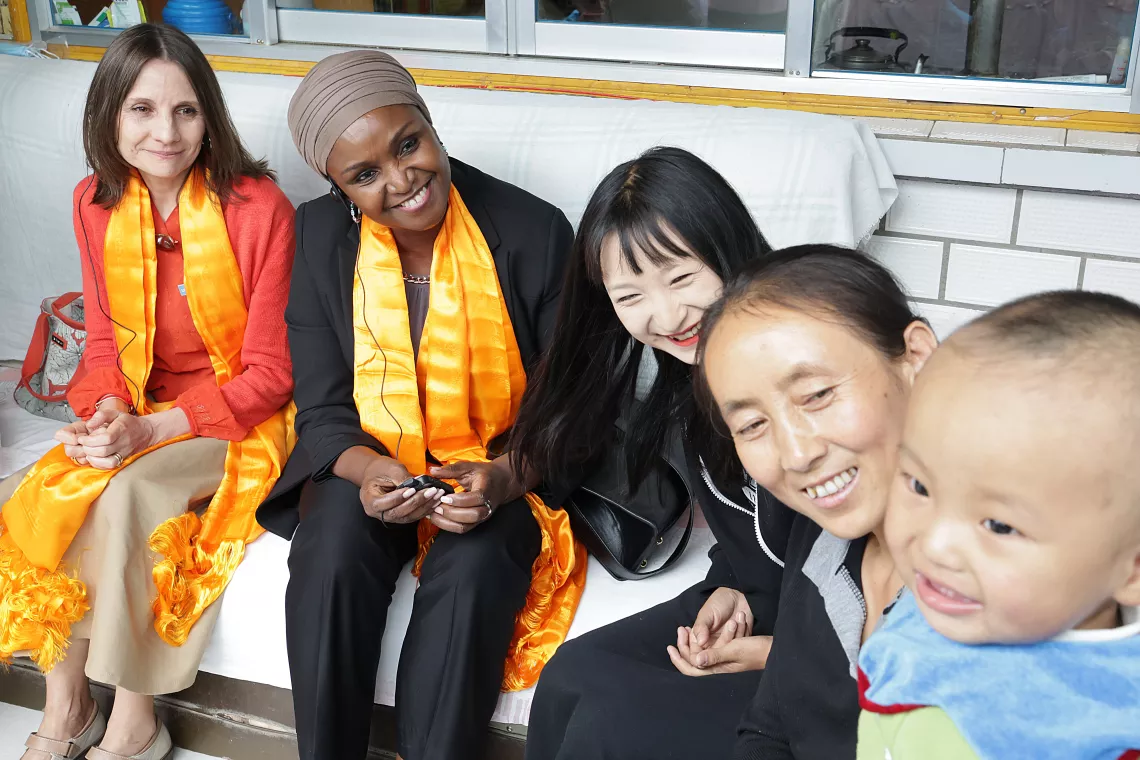
A family from the Tibetan ethnic group in the village also receives counselling from Ajicun. After learning that the family’s 15-month-old boy mostly eats noodles, the village doctor advised them to diversify his meals. And when the family takes the boy to the township hospital for health check-ups, Zhao Mengping also misses no opportunity to stress the importance of science-based nutrition.
Ajicun and Zhao Mengping are among the county’s 669 health workers trained through UNICEF and the National Health Commission’s National Infant and Young Child Feeding Counselling (IYCF) programme. The programme aims to enhance the capacity of primary health workers to deliver quality breastfeeding and complementary feeding counselling services for caregivers with children under 2 years old.
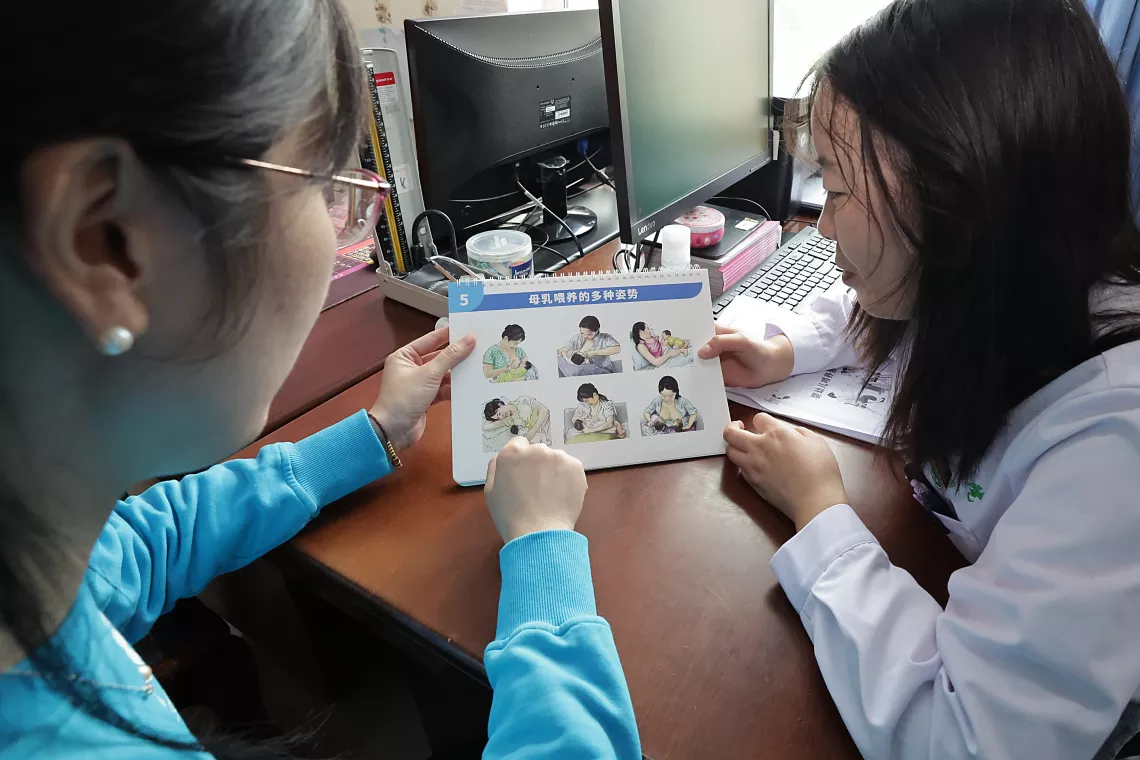
As part of the programme, UNICEF developed a set of IYCF counselling cards, and over 212,400 copies have been distributed so far to township and village health workers in project areas to help them provide counselling. Zhao Mengping told Ms. Comini that she finds the cards very easy to use, and that they help visualize information - especially for grandparents, who may not speak Mandarin or may be illiterate.
By the end of 2023, the national IYCF programme will have trained more than 290,000 township and village health workers in 1,212 counties across 31 provinces. These trained health workers will provide skilled IYCF counselling services to benefit more than 5 million infants and young children and their families.
Providing adequate toilets is not just about health and hygiene. It’s also about dignity.
In rural Qinghai, where the climate is cold and arid, most of the sanitation facilities are unsanitary dry toilets. Using these toilets is certainly not a pleasant experience.
At the Taizi Township Central School, more than 600 students and teachers used to go to pit latrines that were smelly and fly-ridden in summer, and freezing and slippery in winter, when the temperature can drop below minus 20 degrees Celsius. The pits that lack covers, doors and partitions led to concerns over privacy and safety. And the lack of permanent handwashing facilities also put children at risk of diarrhoea and malnutrition.
With the Academy of Agricultural Planning and Engineering under China’s Ministry of Agriculture and Rural Affairs, UNICEF identified and piloted innovative sanitation facilities that are suitable for the local context. In Huzhu, two types of sanitation facilities were built in the Taizi Township Central School and the Taizi Township Health Centre in early 2023. They were fitted with climate-smart technologies that save energy and water, and that reduce emissions and the impact on the environment.
At the water-flushing sanitation facilities in the rural health centre, each flush consumes only 0.5-3 litres of water – less than half the amount required by standard toilets. The system also treats sewage on site.
The newly installed eco-dry toilets in the rural school are equipped with a waste-to-fertilizer system that gets rid of odours and recycles human waste.
Solar energy provides 50-100 per cent of the heating in the buildings that house the toilets, and it keeps the temperature in the toilets above 16 degrees Celsius, even in the coldest weather. The solar energy system also heats water for handwashing.
Sharing their experiences using the new toilets, students from the school told Ms. Comini that they like the new facilities, because they are “very clean and warm in winter,” and because they can wash their hands.
Compared with the old facilities, the new ones have more toilets for females to address the longer queues in women’s bathrooms. And there is a separate accessible room for people with disabilities.
Ms. Chen, an English teacher at the school, is very satisfied with the doors and partitions in the new toilets, which are designed to protect the privacy of adolescent girls. “The privacy of the stalls is great. I feel safe, and I don’t need to worry about anyone peeping.”
“Providing sanitation facilities that are safe, clean and comfortable respects people’s dignity as well as their health and hygiene,” said Ms. Comini.

UNICEF is working to scale up these innovative, climate-smart sanitation facilities elsewhere in China – and globally – for schools and health centres in challenging environments.







